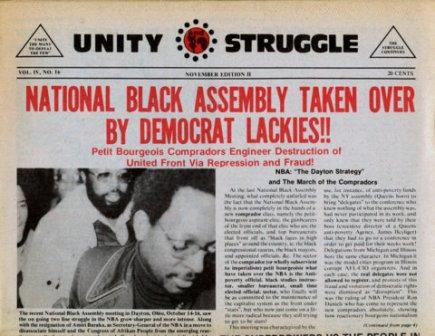
First Published: Unity and Struggle, Vol. IV, No. 16, November 1975.
Transcription, Editing and Markup: Paul Saba
Copyright: This work is in the Public Domain under the Creative Commons Common Deed. You can freely copy, distribute and display this work; as well as make derivative and commercial works. Please credit the Encyclopedia of Anti-Revisionism On-Line as your source, include the url to this work, and note any of the transcribers, editors & proofreaders above.
The May I974 National Conference and ALD demonstrations were high points of the ALSC theoretically. The theoretical struggles in the conference added much clarity to the entire Black Liberation Movement and to the revolutionary struggle in the U.S.A. in general because of the importance of the Black Liberation Movement to all rt revolutionary struggles in the U.S.A. on one hand, but in another sense much of the discussion .was between forces which had already “parted”. Certainly it would have been better, within the criteria of a progressive United Front to be able to maintain a unity of action with most of the forces represented at the conference. A United Front Against Imperialism & Racism is needed, and it must extend as broadly as possible. But in practical reality, this National Conference and the march were the last real attempt to keep a national broad based united front against imperialism and racism afloat.
By the Houston meeting in August 1974, it became apparent that the split between “the left and the right” within the ALSC had the effect of sending the right even further to the right and some of the left so far to the left it felt it necessary to continue on right out of the ALSC, as no longer a priority. The resignation of both Nelson Johnson and Abdul Alkalimat from the Steering Committee, the move to get CAP to accept the responsibility for dealing with the National Secretarial work (which we did not view as a negative development) but we did want to know just what kind of priorities would cause such significant shifts in the leaderships priorities. And certainly we felt those priorities were common (which we later found out were the founding of FFM and still later RWL).
The move to further “autonomize” the locals in Houston, along with the resignations, declinations of responsibilities, and attempts to put CAP in a central administrative role, all suggested a major withdrawal from the ALSC by its leading elements. And would seem to be part of the same kind of left deviation and subjectivism that so severely split the ALSC in the first place, which could now see ALSC, and indeed the support of the Afrikan Liberation struggles, as “no longer a priority”. (Which we argue is incorrect since 3rd World struggles, as Chinese Vice Premier Teng Hsio-ping has said, “constitute a revolutionary motive force propelling the wheel of world history and are the main force combating colonialism, imperialism, and particularly the superpowers.” (our emphasis, April 74, Peking Review, Address to United Nations General Assembly). And the 3rd World has been this revolutionary “main force” mainly through Anti-Imperialist Liberation Fronts, guided by advanced forces. Certainly the support of this “main force” cannot be made a minor detail, and certainly no one who is serious can doubt that the struggle to peoples victory in Zimbabwe, Namibia. Angola, South Afrika, will be even more difficult and bloody than the Portuguese colonies, since the defeat of imperialism & the prevention of neo-colonialism in these countries will radically alter the world situation and bring some second line imperialist countries to the brink of revolution.) This, of course, culminated in the August meeting in D.C. and the emerging RWL’s proposal to completely dismantle ALSC which followed a fairly long period of minimal communication and national work by the national office which is dominated by RWL.
1) If the ALSC is to continue, it must develop not as a mass organization completely dependent on one formation for its ultimate relationship to the Black Liberation Movement, and the anti-imperialist movement in general, but it must be a Black United Front with a mass character, but also in practice a coalition of articulate forces consciously attempting to put forth a common line in support of the Afrikan Liberation Struggles and in support of Anti-Imperialist struggles at large, drawing more and more people to understand the relationship between these international struggles and our domestic struggle for liberation and socialism.
2) It must seek Unity of Action with a broad spectrum of people who might not be willing to take Marxist-Leninist positions or even “advanced anti-imperialist” positions, and in many cases it must seek a broad unity in support of important struggles with all segments of the population. Such unity can be found in many of the struggles against the superpowers. Through such unity of action, the more extended length of time needed to reach common political platform and unity of views, as Dimitroff stated about United Fronts, can be reached. “Unity of views is worked out best of all in joint struggle against the class enemy”. Throughout its life ALSC has genuinely served to put in motion progressive elements of the Black Liberation Movement towards Anti-Imperialist stances and consciousness. The function of the United Front in one aspect is exactly this, to raise the level of consciousness while struggling against a common enemy. It is our view that even those who see party building, i.e., the creation of the revolutionary vanguard party guided by Marxism-Leninism-Mao-Tse-Tung Thought as the main task of the revolutionary movement must see the importance of creating broad United Fronts that can create the “vanguard from the mass” not “the vanguard from the vanguard”.
3) A new structure must be worked out that features fewer national meetings, perhaps one per year, to sum up the years work. Perhaps more regional meetings and a national secretariat made up of elected people from each region who would meet a minimum number of times a year, but whenever necessary, (end of series)